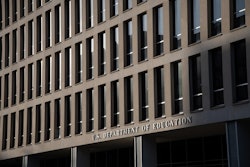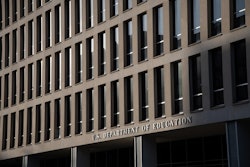After committing a violent crime at 19 years old, D’Quinta Uzzle was handed two life sentences plus 40 years in prison. As he put it, “I was to live the rest of my life in prison, and if I was to die and come back to live again, I would spend that life in prison. If I died and came back again, I would spend the first forty years of that life in prison.” Danny Murillo, a master’s student at California State University, Long Beach.
Danny Murillo, a master’s student at California State University, Long Beach.
That’s when the Second Chance Pell Grant program, run by the University of Baltimore through Uzzle’s former correctional facility, changed his life.
Education, said Uzzle, “opened me up to a whole other world. It helped me build my character, be more determined to not be what they said I was, knowing I could do something different in my life.”
The Second Chance Pell Experiment, launched in 2015 by the Obama administration, is a program that offers incarcerated individuals access to federal Pell Grants as they attend postsecondary education programs, run by universities or colleges, at their facility. Second Chance Pell Grant has so far helped incarcerated students earn over 7,000 college or vocational credentials. The program currently includes 200 institutions.
While working towards his bachelor’s degree, Uzzle met Dr. Mark C. Booker, an adjunct instructor with the Second Chance College Program at the University of Baltimore. Together, they created the Hope, Opportunity, Second chances, and Exhilaration (HOSE) program, work to “put out the fire” in the school to prison pipeline and dramatically decrease the recidivism rate, said Uzzle.
“I know with Second Chance, the recidivism rate will drop to minimum. Once people like me know we can do better, we will do better,” said Uzzle. “Getting higher education in prison needs to be immediate, and it needs to be accessible to prisoners all over the U.S.”
Uzzle and Booker shared their story on Thursday at the second annual Rise Up Conference, led by advocates working to promote access to higher education in prisons for all. Scholars and those impacted by the carceral system from around the world came to share the results of research and programs that help to underscore the importance of higher education for incarcerated people.















